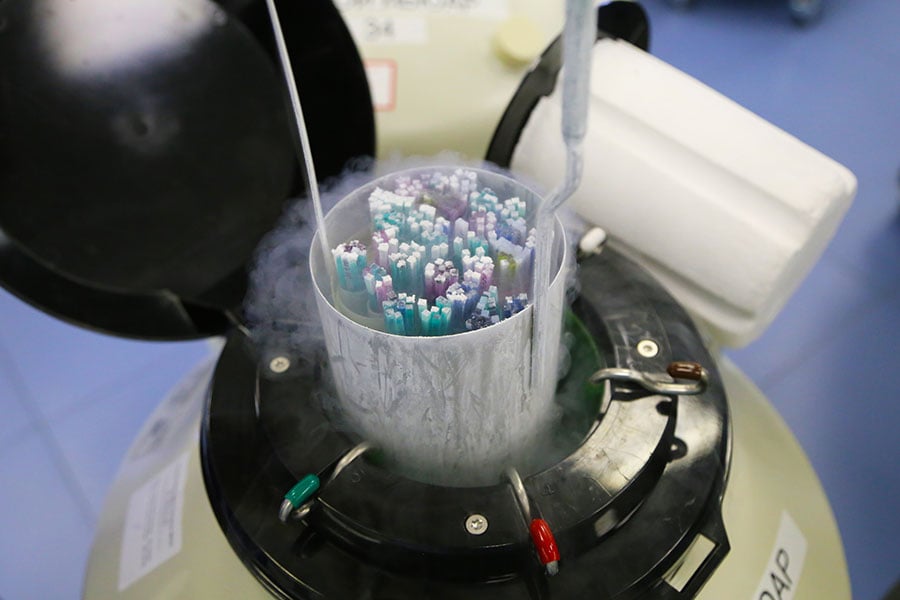It’s Not Just About the Frozen Embryos

An embryologist pulls out frozen embryos and egg cells in a fertility clinic. (Ekaterina Georgievskaia/Shutterstock.com)
I remember a conversation I had with a married Catholic couple a few years ago. They were feeling lost and desperate over their inability to conceive a child. They were casting about for options. They understood there were moral concerns with doing in vitro fertilization (IVF), though they weren’t sure about the specifics, so they asked: “Would it be OK for us to do IVF as long as we don’t make any extra embryos and we’re careful to implant all the ones we make?” The thinking behind their question was understandable and they clearly recognized it would be wrong to produce and then store their embryonic sons and daughters in the deep freeze.
It’s important to note, however, that the possibility of “spare” embryos ending up in “frozen orphanages” would not be the only reason, or even the main reason, that IVF is morally unacceptable. The immorality of IVF is primarily due to the fact that the process turns human procreation into a method of production in which children are made, not begotten.
Embryos certainly face grave risks whenever they are cryopreserved, and a significant percentage of them do not survive the steps of freezing and thawing. The cryostorage of embryos is a form of “collateral damage” that routinely occurs when IVF is done. Ethically speaking, doing IVF and making extra embryos would be more offensive than doing IVF without making extra embryos, in the same way that stealing jewels out of the bank vault and shooting the guards on the way out would be more objectionable than stealing the jewels nonviolently. Yet the action of absconding with the jewels remains seriously wrong in either case, apart from any considerations about whether the guards are harmed. Similarly, IVF does not become morally acceptable merely by eliminating the collateral damage associated with the process, whether it’s the freezing of embryos, the “selective reductions” of twins and triplets, or any of the other objectionable practices that tend to be part of the process.
The heart of the IVF process itself, the practice of joining sperm and egg together in the fertility clinic, remains an intrinsic evil, flowing from the decision to allow our offspring to be “manufactured.” The domain of procreation is a delicate arena, one in which our human vulnerability is uniquely laid bare. We have a particular responsibility to safeguard our own sexuality and the origins of our children from damaging forces in this arena, which implies a duty to respect the marital act as the unique locus and setting for the engendering of new human life.
IVF is not really a “treatment” for infertility, given that the couple remains as infertile after doing IVF as they were before they started the process, with the underlying cause of their sterility remaining unaddressed and unresolved. The procedure offers little more than a workaround to completely bypass the marital act — an expensive, complex, unwieldy substitute, not a genuine therapy.
Through IVF, husband and wife use their own (or even another person’s) sex cells to become “donors”, while constructing their own offspring through a kind of programmed project, with the marital act no longer a part of the equation. In the final analysis, however, only when the bodies of our children arise as the immediate fruit of our own bodily and spousal self-surrender can we say they have been freely and unconditionally received as gifts, rather than coerced into being as the result of human willfulness, financial planning, and scripted biological technologies. Only then can we say that we have not dominated the process of procreation nor preponderated over the origins of our offspring.
By yielding to the project of fabricating our children in the cold, clinical, and commercial venture that is in vitro fertilization, we act against the human dignity of our offspring by sanctioning inequality and setting up a subclass of those who originate in petri dishes and test tubes rather than in the intimacy of the mutual spousal donation that receives life within the protective maternal hearth.
These various explanations of the wrongness of IVF can seem distant and hard for infertile couples to accept. They yearn intensely for a child. The infertility industry appeals to their desire to be in control in an arena where control has been elusive, and part of the allure is also the carefully choreographed assembling of babies who have been planned, screened, and quality controlled.
It is a tragic step when spouses opt for the production of their own offspring in glassware, because they move forward and violate the deepest meaning of their marital union, rather than holding firmly to the truth that their one-flesh communion is the unique and privileged interpersonal sanctuary in which a new and unrepeatable person appears by a Power and a Will that is not their own.

Rev. Tadeusz Pacholczyk, Ph.D. earned his doctorate in neuroscience from Yale and did post-doctoral work at Harvard. He is a priest of the diocese of Fall River, MA, and serves as the Director of Education at The National Catholic Bioethics Center in Philadelphia. See www.ncbcenter.org.
